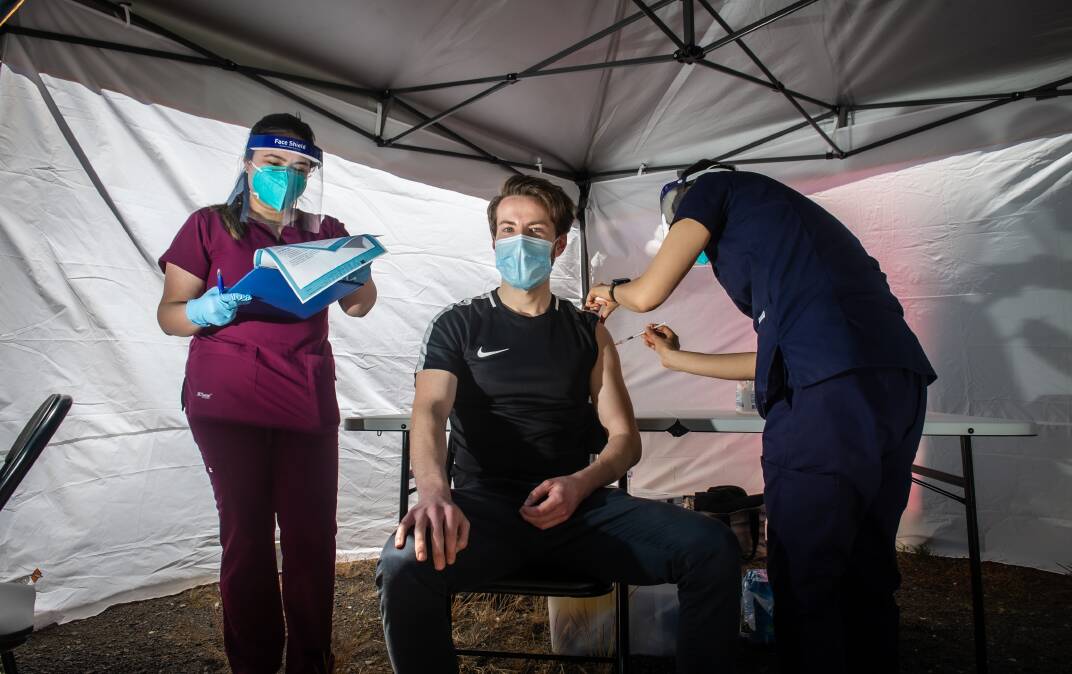No new deaths and a decline in the number of people in hospital with COVID-19 mark the end of the ACT's worst week of the pandemic this winter.
There were 131 people with COVID-19 in hospital in the 24 hours to 8pm Friday, down from a peak of 138 the previous day amidst a spike in the outbreak that has brought ACT hospitals to the brink in the last fortnight.
Of those hospitalisations, four COVID patients are in the ICU and one is on ventilation.
The ACT recorded 1329 new COVID-19 cases, the highest daily new cases since Wednesday.
It comes as experts say Australia must urgently learn more about who is ending up in hospital, and who is dying from the virus to bring down the death rate.
While most Australians are up to date on their COVID vaccine doses and avoiding serious disease, some are ignoring the seven days isolation requirements says professor of viral immunology at Murdoch University, Dr Cassandra Berry.
"We probably all know some who are knowingly sick and have tested positive for COVID-19 but chose to ignore seven days isolation and leave their household to carry out daily activities," she said.
"We need to remind ourselves that chronic COVID effects include reduced lung capacity, alveoli lesions, vocal fold paralysis, pulmonary fibrosis, walking pneumonia, neuropsychiatric, cardiac/kidney inflammation, coagulation and chronic fatigue.
"It is compassionate and kind to care for others by abiding by the isolation requirements if COVID-19 positive. This consideration will undoubtedly lower the risk of more people dying unnecessarily from this potentially fatal and dangerous virus."
Australia approaches 10,000 COVID-10 deaths
The ACT's COVID-19 death toll stands at 80 with the two deaths in the last week - a man in his 50s and a woman in her 80s.
Australia is on the precipice of the grim milestone of 10,000 COVID-19 related deaths, with more than 7000 fatalities reported in the last six months.
Australia has reported 7677 deaths over the course of 2022, taking the country's total to 9930 as of Friday.
There were also 909 COVID-19 related fatalities in 2020 and 1344 in 2021.
"We are going to actually end up with about 14,000 deaths this year from COVID if we keep going at this rate," Program Director of Infectious Diseases and Immunology at Griffith University Nigel McMillan said.
"That will make COVID the number two or number three killer in the country of all causes of deaths.
"Is this what success looks like for Australia in terms of its control of this virus? I would suggest no."
Australia is experiencing a succession of Omicron variants that have kept infection rates high, Deakin University chair in Epidemiology Catherine Bennett said.
However, Australia ranked low in deaths per capita when compared to other countries, she said.
"Whether we look at the total COVID-19 deaths per case, or deaths per capita, Australia sits low on the league tables, together with New Zealand, Taiwan and Japan," Prof Bennett said.
Australia's daily death rates per capita were comparable to the UK and Canada, and lower than France - countries currently in summer and reporting declines in case numbers, she said.
"It is critical that we learn more about those who are ending up in hospital or not surviving their infections, so that we can identify what needs to be done to avoid preventable deaths and bring the case fatality rate down."
Around Australia
NSW
- Deaths: 20
- New cases: 11,085
- Hospitalisations: 1621
- ICU: 45
Victoria
- Deaths: 13
- New cases: 6424
- Hospitalisations: 462
- ICU: 18
- Ventilation: 4
Queensland
- Deaths:
- New cases: 4976
- Hospitalisations: 602
- ICU: 19
Tasmania
- Deaths:
- New cases: 1144
- Hospitalisations: 47
- ICU: 5
South Australia
- SA no longer provides daily updates
Western Australia
- WA no longer provides daily updates
With AAP
Our coverage of the health and safety aspects of this outbreak of COVID-19 in the ACT is free for anyone to access. However, we depend on subscription revenue to support our journalism. If you are able, please subscribe here. If you are already a subscriber, thank you for your support. You can also sign up for our newsletters for regular updates.








